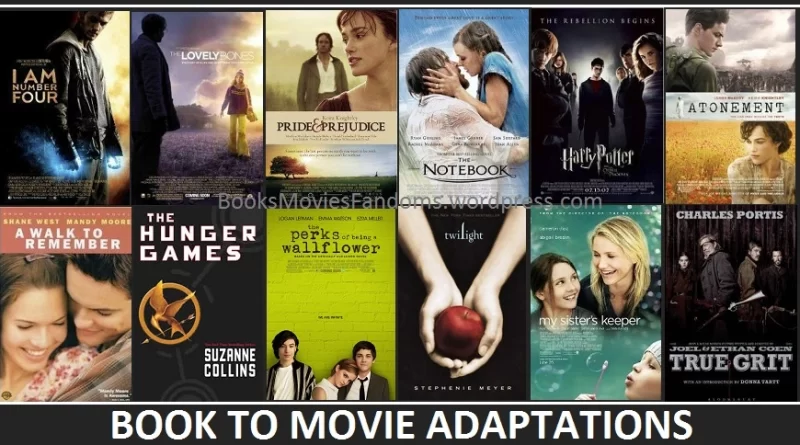World Book Day: A Look at Literary Adaptations in Film and TV
Introduction
World Book Day is a celebration of the written word, but it’s also an excellent opportunity to explore the profound impact literature has had on other forms of storytelling. While many enthusiasts don World Book Day costumes to embody their favourite characters, one of the most prevalent ways books continue to influence our lives is through their adaptation into movies and TV series. These adaptations not only bring beloved stories to a wider audience but also offer a unique perspective on the source material. On this World Book Day, let’s take a closer look at some popular books that have been adapted into memorable films and TV shows, highlighting the magic of literary storytelling in a visual medium.
- “The Lord of the Rings” by J.R.R. Tolkien
J.R.R. Tolkien’s epic fantasy series, “The Lord of the Rings,” has been brought to life on the big screen in a magnificent way. Director Peter Jackson’s adaptation captures the grandeur and depth of Tolkien’s world, complete with breathtaking landscapes, intricate characters, and unforgettable battles. The success of this film trilogy demonstrates how a well-executed adaptation can introduce a new generation to the wonders of Middle-earth while remaining faithful to the essence of the books.
- “Game of Thrones” by George R.R. Martin
George R.R. Martin’s epic series “A Song of Ice and Fire” was adapted into the massively popular HBO series, “Game of Thrones.” The show, known for its intricate political intrigue, complex characters, and epic battles, became a cultural phenomenon. While the TV series deviated from the source material in later seasons, it served as an introduction for many to Martin’s richly detailed world of Westeros and Essos.
- “The Great Gatsby” by F. Scott Fitzgerald
- Scott Fitzgerald’s classic novel “The Great Gatsby” has seen multiple film adaptations, with perhaps the most famous being the 2013 version directed by Baz Luhrmann. Starring Leonardo DiCaprio as Jay Gatsby and Carey Mulligan as Daisy Buchanan, this visually stunning adaptation captures the decadence and tragedy of the Jazz Age. It showcases how the allure of the American Dream and the excesses of the 1920s continue to resonate with contemporary audiences.
- “Harry Potter” series by J.K. Rowling
J.K. Rowling’s beloved “Harry Potter” series has been adapted into a successful film franchise, consisting of eight movies. The films allow fans to revisit the magical world of Hogwarts, follow Harry, Hermione, and Ron on their adventures, and witness the battle against the dark wizard Voldemort. The “Harry Potter” films not only capture the essence of the books but also introduce the enchanting world of wizardry to a wider audience.
- “The Handmaid’s Tale” by Margaret Atwood
Margaret Atwood’s dystopian novel “The Handmaid’s Tale” has been adapted into a critically acclaimed TV series. The show, which explores themes of totalitarianism and gender oppression, has received praise for its thought-provoking storytelling and stellar performances. “The Handmaid’s Tale” adaptation serves as a powerful reminder of the importance of literature in addressing contemporary social issues.
- “The Count of Monte Cristo” by Alexandre Dumas
Alexandre Dumas’ thrilling novel “The Count of Monte Cristo” has inspired numerous film adaptations, each offering its interpretation of the tale of revenge and redemption. From classic adaptations like the 1934 film to more recent ones like the 2002 version starring Jim Caviezel, this story of Edmond Dantès’s quest for vengeance continues to captivate audiences with its timeless themes.
- “The Shining” by Stephen King
Stephen King’s horror masterpiece “The Shining” was famously adapted into a film by Stanley Kubrick in 1980. While the movie differs from the book in several significant ways, it has become a cult classic, known for its iconic scenes, including the creepy twins and the phrase “Here’s Johnny!” The adaptation showcases how a skilled director can put their unique stamp on a well-known story.
- “The Witcher” by Andrzej Sapkowski
Andrzej Sapkowski’s fantasy series “The Witcher” found new life as a hit Netflix series starring Henry Cavill as Geralt of Rivia. The show blends elements from the books and the popular video game adaptations to create a visually stunning and action-packed series. It introduces viewers to a world filled with monsters, magic, and moral ambiguity, all while staying true to the source material’s dark and gritty tone.
- “Gone Girl” by Gillian Flynn
Gillian Flynn’s psychological thriller “Gone Girl” became a blockbuster film directed by David Fincher in 2014. Starring Ben Affleck and Rosamund Pike, the adaptation masterfully captures the suspense and mind-bending twists of the novel. The film’s success reaffirms the appeal of psychological thrillers and the enduring fascination with unreliable narrators.
- “The Hunger Games” by Suzanne Collins
Suzanne Collins’ dystopian trilogy “The Hunger Games” was adapted into a film series, with Jennifer Lawrence portraying the iconic heroine, Katniss Everdeen. The movies shed light on the themes of oppression, rebellion, and the consequences of a reality TV-driven society. The adaptation showcases how literature can inspire discussions about political and social issues in a compelling and accessible way.
Conclusion
Literary adaptations in film and TV have the power to breathe new life into beloved books, introducing them to a broader audience and allowing fans to experience their favourite stories in a different medium. On this World Book Day, let’s celebrate the creative synergy between literature and visual storytelling. These adaptations not only honour the source material but also provide a fresh perspective on timeless tales, ensuring that the magic of books continues to captivate and inspire generations to come. So, whether you’re a bookworm or a film buff, take some time to appreciate the magic of literary adaptations this World Book Day.




